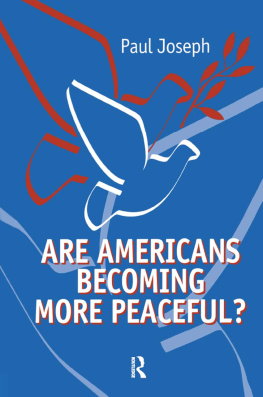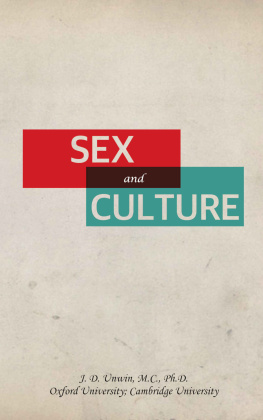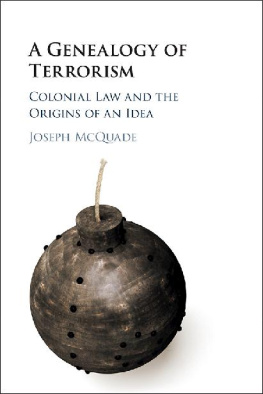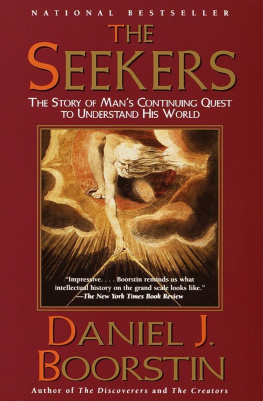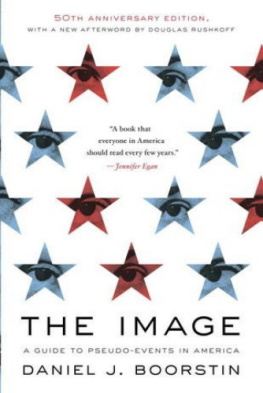Daniel Joseph Boorstin - The Americans: The Colonial Experience
Here you can read online Daniel Joseph Boorstin - The Americans: The Colonial Experience full text of the book (entire story) in english for free. Download pdf and epub, get meaning, cover and reviews about this ebook. year: 1958, publisher: Vintage Books, genre: Religion. Description of the work, (preface) as well as reviews are available. Best literature library LitArk.com created for fans of good reading and offers a wide selection of genres:
Romance novel
Science fiction
Adventure
Detective
Science
History
Home and family
Prose
Art
Politics
Computer
Non-fiction
Religion
Business
Children
Humor
Choose a favorite category and find really read worthwhile books. Enjoy immersion in the world of imagination, feel the emotions of the characters or learn something new for yourself, make an fascinating discovery.

- Book:The Americans: The Colonial Experience
- Author:
- Publisher:Vintage Books
- Genre:
- Year:1958
- Rating:3 / 5
- Favourites:Add to favourites
- Your mark:
- 60
- 1
- 2
- 3
- 4
- 5
The Americans: The Colonial Experience: summary, description and annotation
We offer to read an annotation, description, summary or preface (depends on what the author of the book "The Americans: The Colonial Experience" wrote himself). If you haven't found the necessary information about the book — write in the comments, we will try to find it.
The Americans: The Colonial Experience — read online for free the complete book (whole text) full work
Below is the text of the book, divided by pages. System saving the place of the last page read, allows you to conveniently read the book "The Americans: The Colonial Experience" online for free, without having to search again every time where you left off. Put a bookmark, and you can go to the page where you finished reading at any time.
Font size:
Interval:
Bookmark:
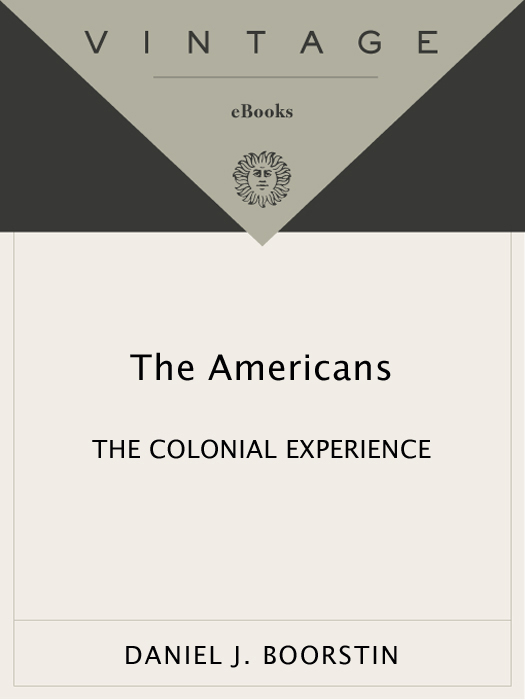
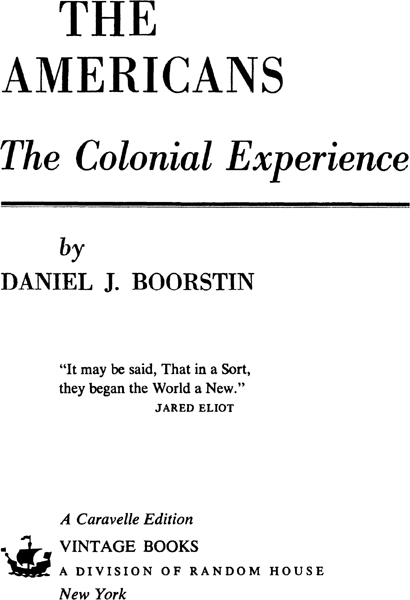
BOOKS BY DANIEL J. BOORSTIN
The Creators
*
The Discoverers
*
The Americans: The Colonial Experience
The Americans: The National Experience
The Americans: The Democratic Experience
*
The Mysterious Science of the Law
The Lost World of Thomas Jefferson
The Genius of American Politics
America and the Image of Europe
The Image: A Guide to Pseudo-Events in America
The Decline of Radicalism
The Sociology of the Absurd
Democracy and Its Discontents
The Republic of Technology
The Exploring Spirit
The Republic of Letters
Hidden History
*
The Landmark History of the American People (with Ruth F. Boorstin)
A History of the United States (with Brooks M. Kelley)
FOR Ruth
Governor William Bradford, an eyewitness, reported the landing of the Mayflower passengers on the American shore in mid-November 1620:
They fell upon their knees and blessed the God of heaven, who had brought them over the vast and furious ocean, and delivered them from all the periles and miseries thereof, againe to set their feete on the firme and stable earth, their proper elemente. Being thus passed the vast ocean, and a sea of troubles they had now no freinds to wellcome them, nor inns to entertaine or refresh their weatherbeaten bodys, no houses or much less townes to repaire too, to seeke for succoure. It is recorded in scripture as a mercie to the apostle and his shipwraked company, that the barbarians shewed them no smale kindnes in refreshing them, but these savage barbarians, when they mette with them were readier to fill their sids full of arrows then otherwise. And for the season it was winter, and they that know the winters of that cuntrie know them to be sharp and violent, and subjecte to cruell and feirce stormes, deangerous to travill to known places, much more to serch an unknown coast. Besids, what could they see but a hidious and desolate wildernes, full of wild beasts and willd men? and what multituds ther might be of them they knew not. Nether could they, as it were, goe up to the tope of Pisgah, to vew from this willdernes a more goodly cuntrie to feed their hops; for which way soever they turnd their eys (save upward to the heavens) they could have litle solace or content in respecte of any outward objects. For summer being done, all things stand upon them with a wetherbeaten face; and the whole countrie, full of woods and thickets, represented a wild and savage heiw. If they looked behind them, ther was the mighty ocean which they had passed, and was now as a maine barr and goulfe to seperate them from all the civill parts of the world.
* * *
Never had a Promised Land looked more unpromising. But within a century and a halfeven before the American Revolutionthis forbidding scene had become one of the more civill parts of the world. The large outlines of a new civilization had been drawn. How did it happen?

BOOK ONE
THE VISION AND THE REALITY
PART ONE
PART TWO
PART THREE
PART FOUR
23.
BOOK TWO
VIEWPOINTS AND INSTITUTIONS
PART FIVE
PART SIX
PART SEVEN
PART EIGHT
PART NINE
40.
BOOK THREE
LANGUAGE AND THE PRINTED WORD
PART TEN
PART ELEVEN
PART TWELVE
52.
BOOK FOUR
WARFARE AND DIPLOMACY
PART THIRTEEN
England purchased for some of her subjects, who found themselves uneasy at home, a great estate in a distant country.
ADAM SMITH
AMERICA began as a sobering experience. The colonies were a disproving ground for Utopias. In the following chapters we will illustrate how dreams made in Europethe dreams of the zionist, the perfectionist, the philanthropist, and the transplanterwere dissipated or transformed by the American reality. A new civilization was being born less out of plans and purposes than out of the unsettlement which the New World brought to the ways of the Old.

I write the Wonders of the Christian Religion, flying from the depravations of Europe, to the American Strand; and wherewith His Divine Providence hath irradiated an Indian Wilderness.
COTTON MATHER
T HE Arbella, a ship of three hundred and fifty tons, twenty-eight guns, and a crew of fifty-two, during the spring of 1630 was carrying westward across the Atlantic the future leaders of Massachusetts Bay Colony. The ship had sailed from Cowes in the Isle of Wight, on March 29, and was not to reach America till late June. Among the several ways of passing the time, of cementing the community and of propitiating God, perhaps the most popular was the sermon. The leader of the new community, John Winthrop, while preaching to his fellow-passengers, struck the keynote of American history. Wee shall be, Winthrop prophesied, as a Citty upon a Hill, the eies of all people are uppon us; soe that if wee shall deale falsely with our god in this worke wee have undertaken and soe cause him to withdrawe his present help from us, wee shall be made a story and a by-word through the world. No one writing after the fact, three hundred years later, could better have expressed the American sense of destiny. In describing the Puritan experience we will see how this sense of destiny came into being, and what prevented it from becoming fanatical or utopian.
The Puritan beacon for misguided mankind was to be neither a book nor a theory. It was to be the community itself. America had something to teach all men: not by precept but by example, not by what it said but by how it lived. The slightly rude question What of it? was thus, from the earliest years, connected with belief in an American destiny.

N EVER WAS A PEOPLE more sure that it was on the right track. That which is our greatest comfort, and meanes of defence above all others, Francis Higginson wrote in the earliest days, in New-Englands Plantation, is, that we have here the true Religion and holy Ordinances of Almightie God taught amongst us thus we doubt not but God will be with us, and if God be with us, who can be against us?
But their orthodoxy had a peculiar character. Compared with Americans of the 18th or the 19th century, the Puritans surely were theologyminded. The doctrines of the Fall of Man, of Sin, of Salvation, Predestination, Election, and Conversion were their meat and drink. Yet what really distinguished them in their day was that they were less interested in theology itself, than in the application of theology to everyday life, and especially to society. From the 17th-century point of view their interest in theology was practical. They were less concerned with perfecting their formulation of the Truth than with making their society in America embody the Truth they already knew. Puritan New England was a noble experiment in applied theology.
Font size:
Interval:
Bookmark:
Similar books «The Americans: The Colonial Experience»
Look at similar books to The Americans: The Colonial Experience. We have selected literature similar in name and meaning in the hope of providing readers with more options to find new, interesting, not yet read works.
Discussion, reviews of the book The Americans: The Colonial Experience and just readers' own opinions. Leave your comments, write what you think about the work, its meaning or the main characters. Specify what exactly you liked and what you didn't like, and why you think so.


